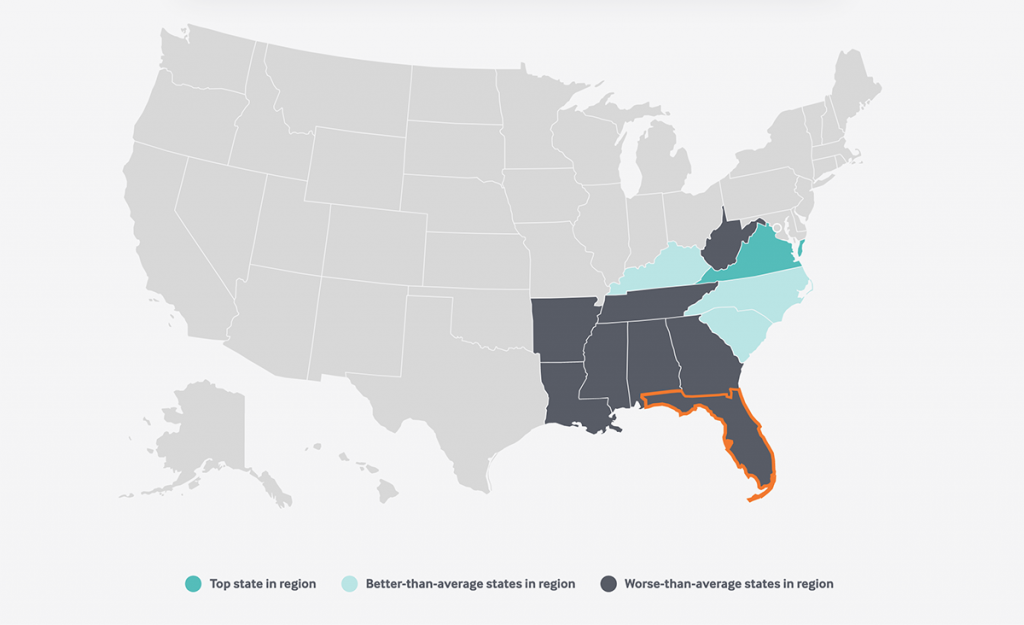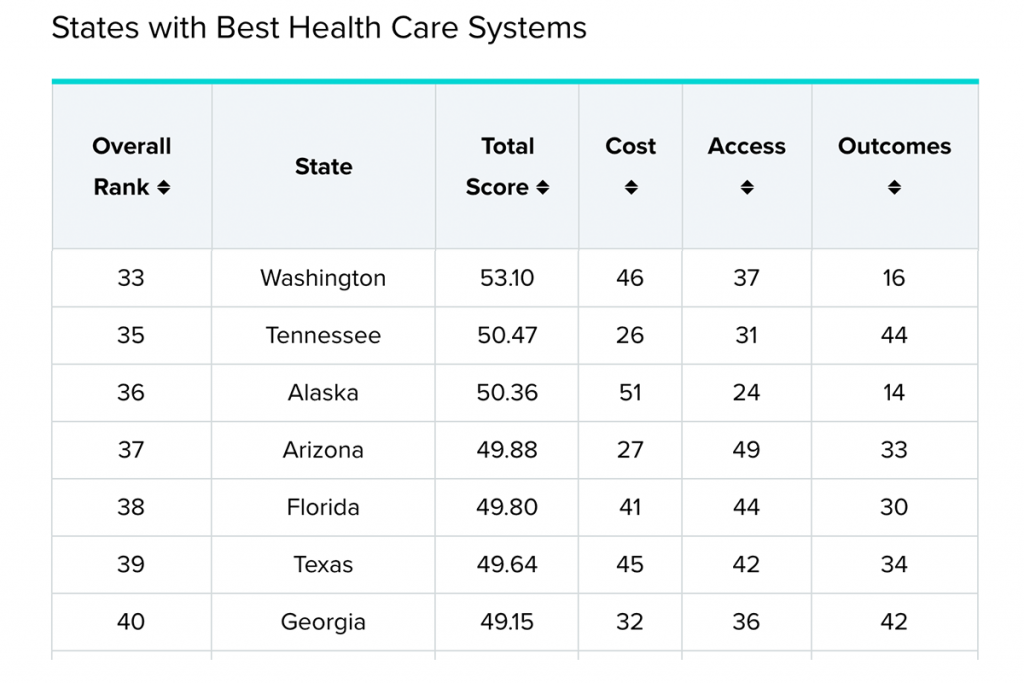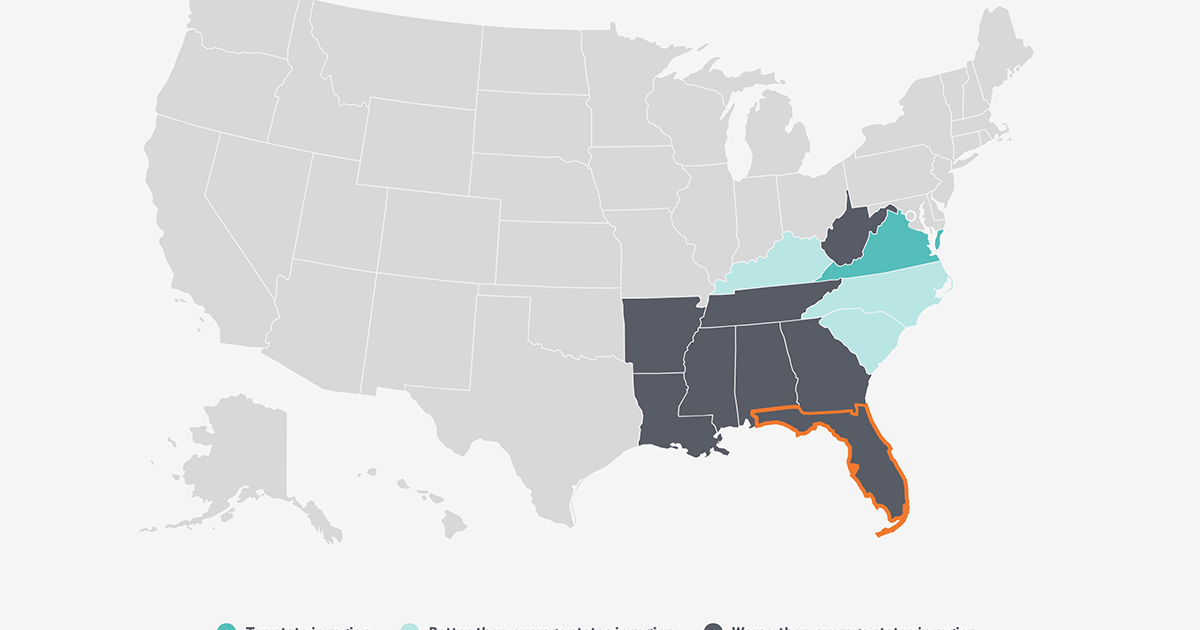Why Are Comprehensive Cancer Centers Important?
- In light of the news that the Florida governor’s wife has breast cancer, those seeking medical care in Florida, whether for cancer or another diagnosis, should know that the state's health system ranks among the lowest in the United States.
- The Commonwealth Fund ranks each of the 50 states from best to worst overall health system performance, and for its 2020 Scorecard, Florida ranks 41st overall.
- SurvivorNet experts advise that when seeking cancer treatment, it's vitally important to seek care at a comprehensive cancer center, when and if possible.
In September 2020, The Commonwealth Fund a U.S. non-profit and non-partisan foundation that seeks to promote a high-performing health care system that achieves better access, quality and efficiency released its 2020 Scorecard on State Health System Performance. The scorecard ranks each of the 50 states from best to worst overall health system performance, including access, affordability, prevention and treatment.
Read More

WalletHub is a personal finance website that also released a ranking on state’s health care systems. This year, it ranked Florida 38th overall better than The Commonwealth Fund, but 13 points lower than U.S. News & World Report’s ranking. In terms of access, WalletHub ranked Florida 44, three points lower than U.S. News & World Report, and 30 in terms of cost.

Florida's lower-than-average rank on the health system performance scale is concerning as it's one of the country's fastest-growing states in terms of population. The state's population has swelled by another 3 million people in the last 10 years, according to 2020 Census Data. The data is further alarming as nearly 21% of the state's 21.5 million residents are over the age of 65, and it's known that a person's risk of developing cancer increases with age.
That's why SurvivorNet experts advise that when seeking cancer treatment, it's vitally important to seek care at a comprehensive cancer center, when and if possible.
What is a Comprehensive Cancer Center?
First, it's important for cancer patients to understand what a comprehensive cancer center is when seeking care.
Seeking Care at a Comprehensive Cancer Center
"A comprehensive cancer center is a cancer center that has been essentially vetted by the National Cancer Institute, and provides outstanding clinical care in addition to basic and translational science and research," Dr. Ted Teknos, president at University Hospitals Seidman Cancer Center in Cleveland, Ohio, tells SurvivorNet.
Across the U.S., there are only about 50 accredited comprehensive cancer centers, one of which is in Florida Moffitt Cancer Center in Tampa. Sylvester Comprehensive Cancer Center is also in Florida (Miami), but despite its name, NCI ranks it as a cancer center, not a comprehensive cancer center.
What’s the difference between the two, you might ask? Well, an NCI-designated cancer center means that a center has met NCI standards for cancer prevention, clinical services or research, but not all three. If a facility is an NCI-designated comprehensive cancer center, that means it meets NCI standards in all three categories.
Why Are Comprehensive Cancer Centers Important?
Now that you know what a comprehensive cancer center is, next you should know why they're important. And why you should seek cancer care at one, if possible, over any other health care institution.
"What these comprehensive cancer centers allow us (doctors) to do is take discoveries from the research laboratories and bring them to patients in the form of cutting-edge clinical trials," Dr. Teknos says.
This is very important, Dr. Teknos adds, because when looking at cancer outcomes in patients who were treated at non-comprehensive cancer centers versus NCI-designated comprehensive cancer centers, cure rates in total are 20% higher at comprehensive cancer centers.
"And that's because they (comprehensive cancer centers) provide not only the latest and greatest cancer care, but also the supportive care that many cancer patients need," Dr. Teknos says. These additional services could be anything from speech and swallowing therapy to emotional support.
This isn't to say that every cancer should be treated in a major cancer center, SurvivorNet experts say. Such centers are typically recommended when a cancer is rare, complex or aggressive.
What If You Can't Get to a Comprehensive Cancer Center?
Not every hospital or medical institution can be a designated comprehensive cancer center, but the data is clear that these centers are extremely helpful especially when your disease is complex.
Understanding the Importance of a Multidisciplinary Center
There are plenty of excellent physicians who aren't at comprehensive cancer centers. But when you're looking into cancer care, you should be asking yourself important questions, such as: "Am I getting doctors with different specialties like medical oncology, radiation oncology, surgery, pathology and radiology?"
The really important thing is that you have the right doctors, and that they know the latest science and treatment options available. That can happen away from a major cancer center or it can happen at one. In order to get the best guidance, you'll need to ask and discuss further with your doctor.
Contributing: SurvivorNet staff
Learn more about SurvivorNet's rigorous medical review process.

